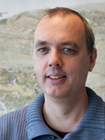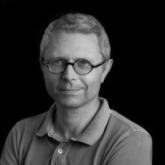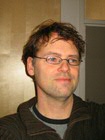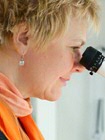Team and contact details
University of Groningen
Faculty of Arts
Groningen Institute of Archaeology
Poststraat 6
9712 ER Groningen
Contact: Hans Huisman

Hans Huisman University of Groningen
Hans Huisman is professor by special appointment of geoarchaeology and archaeometry at the university of Groningen, and senior researcher at the Cultural Heritage Agency of the Netherlands. With a background in soil science and geochemistry, he now applies techniques and expertise from natural sciences in archaeological research. He has a special interest in the agricultural transition in lowlands.
In geoarchaeological research his major specialization is the application of soil micromorphology on archaeological site, where he studies e.g. Middle- and Late Palaeolithic sites and soils, Mesolithic pit hearths, Neolithic middens and cultivated fields, Celtic Fields, terp mounds, monastery floors, anthropogenic dark earths. Archaeometric research focusses on the production and provenance of glass, metals and ceramics. In addition to research and teaching he is member of the editorial board of the Journal of Archaeological Science.

Kim Cohen Utrecht University
I am a hunter-gatherer of landscape data that I farm into digital map and data products and scientific output. My study area is the lowlands of the North Sea region, including the present offshore and including all sedimentary systems flowing towards and out of it. I have published on Holocene sea-level rise, land subsidence and sedimentation history of the Rhine-Meuse delta and the Netherlands in general, on Late Pleistocene sedimentary archives, on Holocene coastal plain groundwater tables and Rhine flooding history. I have worked with archaeologists in joint scientific and applied research, on topics such as ‘river-adjacent archaeology’ of younger periods (Metal Ages, Roman, Medieval), ‘submerged/drowned deltaic and offshore archaeology’ of stone age periods (Paleolithic of the North Sea region, Mesolithic Doggerland, Neolithic of the modern delta and coastal plain [this project!]), and the exchange of geomorphology and paleoenvironmental information with archaeological information in general. I have created and maintain geological-geomorphological mapping datasets of the Netherlands that importantly include age-labelling as attributes, allowing to query age-maps. These interpreted and referenced datasets are a critical resource and central in the approach of my research and that of many collaborators, and a vehicle in the bi-directional exchange between geosciences and archeology. They have found abundant use and application in shallow geological, geomorphological and geohydrological surveying, mapping, modelling and consultancy, as well as in cultural heritage management by professionals in companies, governmental bodies, knowledge institutions. They are underpinned by data distributed over further databases (borehole databases of various parties, overviews of 14C dating, sea-level reconstruction datasets in international standardized formats). If I don’t do research, I lecture, supervise thesis students, coach and train PhD candidates, advice professionals and journalists, do associate editor work for the geomorphological journal Earth Surface Processes and Landforms and regularly review papers.

Ana Smuk PhD candidate RUG
Ana Smuk is a PhD candidate at the University of Groningen, trained as an environmental archaeologist (archaeobotanist) at the University of Sheffield. She will use a multi-proxy botanical approach to investigate the vegetation characteristics, management and human-environment relationship with questions of introduction and development of crop cultivation between 6000 and 4000 BC in the Netherlands. Ana’s interests span to ethnology, anthropology, archaeozoology, geoarchaeology, and history as each provides valuable information for agricultural development and other relevant archaeobotanical questions.
Supervisors: prof. Hans Huisman, dr. Mans Schepers and prof. Marco Madella

Elena Familetto PhD candidate UU
Elena Familetto is a PhD candidate at Utrecht University working on the palaeogeographical and geoarchaeological aspects of Finding Suitable Grounds under the supervision of Dr. Kim Cohen (UU), Prof. Hans Huisman (RUG), Dr. Esther Stouthamer (UU), and Dr. Wim Hoek (UU). She has a background in archaeological science, field archaeology, and environmental science which have shaped her research interests around human-environment relations and anthropogenic landscape change.

Marco Madella
I am an ICREA Research Professor in the Department of Humanities, Universitat Pompeu Fabra, where I coordinate the Culture and Socio-Ecological Dynamics (CaSEs) research group. I also hold an Honorary Professorship in the School of Geography, Archaeology and Environmental Studies at the University of the Witwatersrand, South Africa and in the Center for Archaeology, Heritage & Museum Studies, Shiv Nadar University, India. My background is in archaeobotany and environmental archaeology, and I am interested in understanding the socio-ecological dynamics of past human populations in extreme environments such as hyper-humid and arid/semi-arid, from Europe to the tropics. My interests span from past vegetation histories and land use, the modelling and simulation of processes in human behavioural change, people-plants co-evolutionary dynamics, long-term trajectories of biodiversity and sustainability in prehistoric societies, and the origin and resilience of agriculture. Agriculture had an immense impact on humans and non-humans, and the future of our world is linked to making agriculture sustainable by maintaining biodiversity, re-evaluating traditional knowledge and mitigating environmental impact. Archaeology can play a key role in all these lines of investigation.

Nico Willemse
Nico Willemse is senior researcher at RAAP Archaeological Consultancy (RAAP) , the largest independent archaeological company in the Netherlands . He has a PhD in Earth Sciences and MSc in Prehistory of Northwestern Europe. As an earth scientist he was PI of several large scale excavations in the Rhine-Meuse delta. He has a special interest in human-landscape interactions during the Holocene.

Lucy Kubiak-Martens
Lucy Kubiak-Martens is an archaeobotanist working as a senior researcher at BIAX Consult Biological Archaeology & Environmental Reconstruction, the Netherlands. Her field of work and research interest is archaeobotany of hunter-gatherers and early agrarian communities. She is particularly interested in patterns of use of (wild) plant foods, especially with regard to types of resource environment, seasonality and ethnographic modelling in archaeology. She is specialised in plant macro-remains analysis and identification of charred archaeological parenchyma. Her work is increasingly focusing on SEM analysis of food residues encrusted on pottery. Her contribution to the FSG project is analysis of charred particles of herbaceous plants (epidermal and parenchymatous tissues). This analysis should reveal what vegetation was burnt and how the Swifterbant people managed to clear suitable grounds for cereal cultivation.
PhD candidates have further supervisors and advisors from RUG and UU staff. See their personal pages.
| Last modified: | 13 January 2022 08.52 a.m. |
